Ethical Challenges in Health and Social Care Discipline: Dissertation
VerifiedAdded on 2023/01/12
|11
|2368
|1
Dissertation
AI Summary
This dissertation delves into the ethical challenges associated with health and social care, particularly within the context of the UK's National Health Service (NHS). The research investigates the implementation of complementary and alternative medicine (CAM) practices and the ethical dilemmas they present. The study examines the role of CAM in enhancing patients' quality of life, contrasts it with conventional medicine, and explores related policies, regulations, and legal issues. The methodology includes a descriptive research design with qualitative methods. The dissertation aims to evaluate the benefits of CAM, identify ethical issues, and formulate strategies for ethically integrating CAM practices within the NHS, considering patient autonomy, consent, and the use of public resources. The literature review synthesizes expert opinions and research findings from journal articles and government reports to support the analysis of ethical considerations within the healthcare landscape. The conclusion and recommendations provide actionable insights to address the ethical challenges identified.
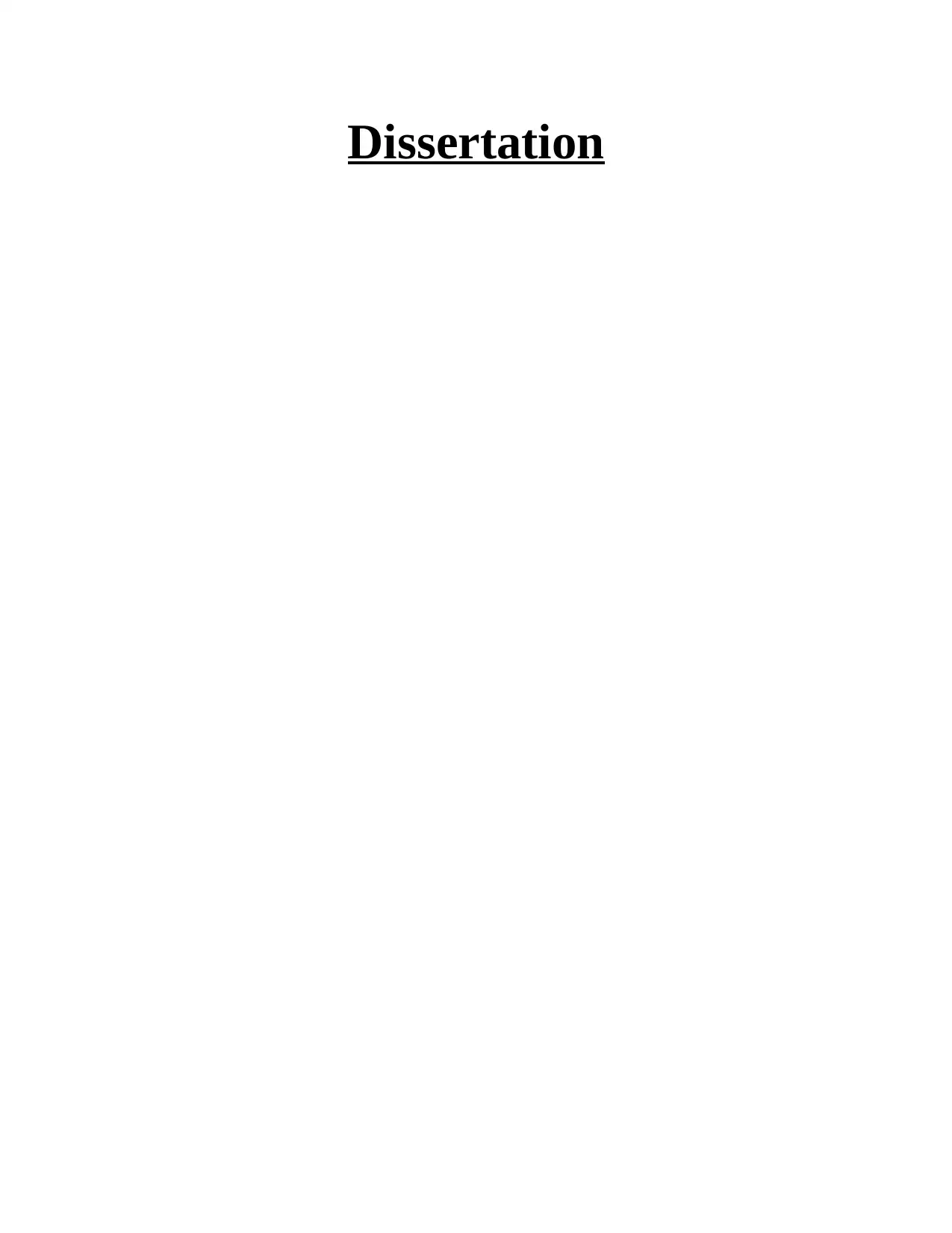
Dissertation
Paraphrase This Document
Need a fresh take? Get an instant paraphrase of this document with our AI Paraphraser
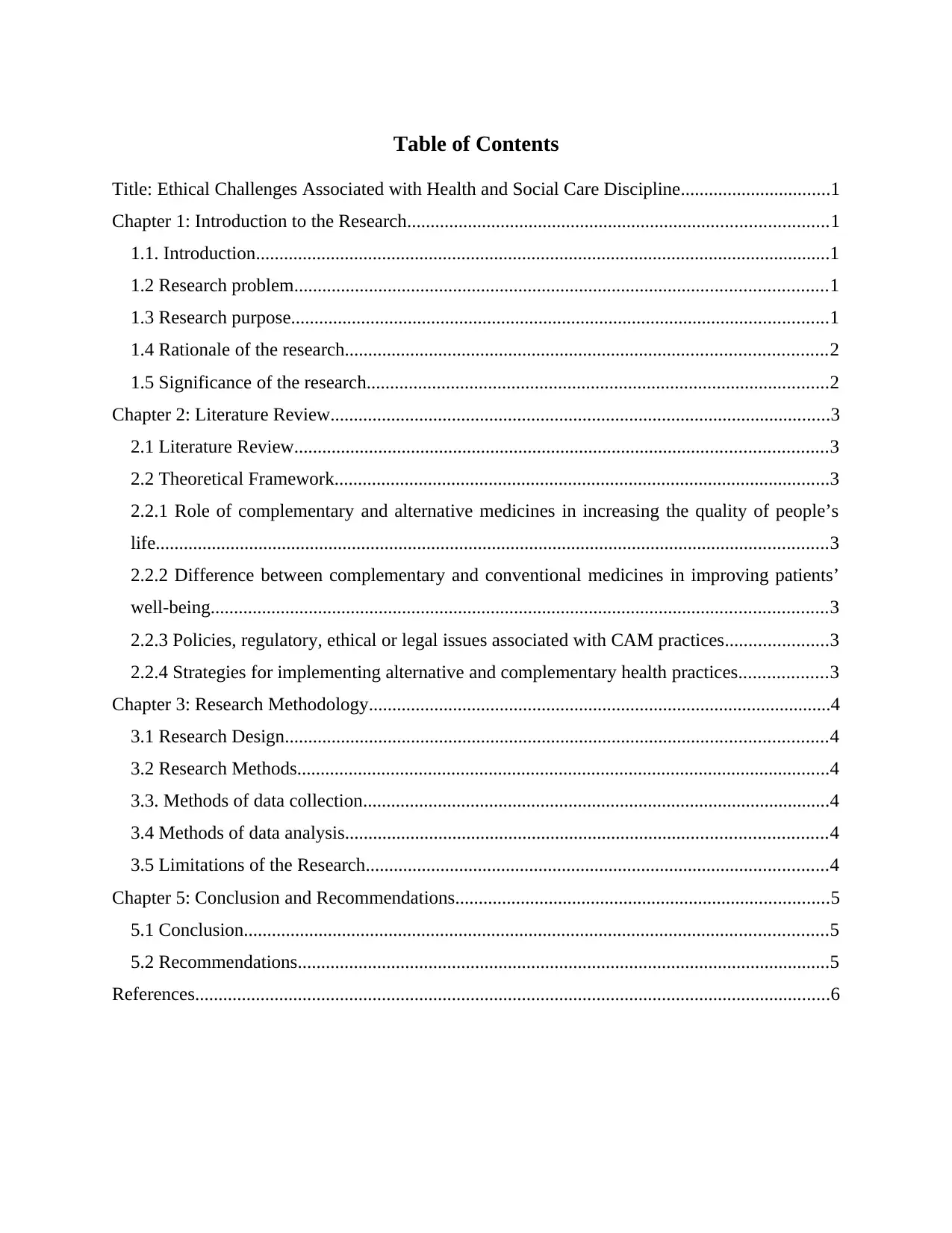
Table of Contents
Title: Ethical Challenges Associated with Health and Social Care Discipline................................1
Chapter 1: Introduction to the Research..........................................................................................1
1.1. Introduction...........................................................................................................................1
1.2 Research problem..................................................................................................................1
1.3 Research purpose...................................................................................................................1
1.4 Rationale of the research.......................................................................................................2
1.5 Significance of the research...................................................................................................2
Chapter 2: Literature Review...........................................................................................................3
2.1 Literature Review..................................................................................................................3
2.2 Theoretical Framework..........................................................................................................3
2.2.1 Role of complementary and alternative medicines in increasing the quality of people’s
life................................................................................................................................................3
2.2.2 Difference between complementary and conventional medicines in improving patients’
well-being....................................................................................................................................3
2.2.3 Policies, regulatory, ethical or legal issues associated with CAM practices......................3
2.2.4 Strategies for implementing alternative and complementary health practices...................3
Chapter 3: Research Methodology...................................................................................................4
3.1 Research Design....................................................................................................................4
3.2 Research Methods..................................................................................................................4
3.3. Methods of data collection....................................................................................................4
3.4 Methods of data analysis.......................................................................................................4
3.5 Limitations of the Research...................................................................................................4
Chapter 5: Conclusion and Recommendations................................................................................5
5.1 Conclusion.............................................................................................................................5
5.2 Recommendations..................................................................................................................5
References........................................................................................................................................6
Title: Ethical Challenges Associated with Health and Social Care Discipline................................1
Chapter 1: Introduction to the Research..........................................................................................1
1.1. Introduction...........................................................................................................................1
1.2 Research problem..................................................................................................................1
1.3 Research purpose...................................................................................................................1
1.4 Rationale of the research.......................................................................................................2
1.5 Significance of the research...................................................................................................2
Chapter 2: Literature Review...........................................................................................................3
2.1 Literature Review..................................................................................................................3
2.2 Theoretical Framework..........................................................................................................3
2.2.1 Role of complementary and alternative medicines in increasing the quality of people’s
life................................................................................................................................................3
2.2.2 Difference between complementary and conventional medicines in improving patients’
well-being....................................................................................................................................3
2.2.3 Policies, regulatory, ethical or legal issues associated with CAM practices......................3
2.2.4 Strategies for implementing alternative and complementary health practices...................3
Chapter 3: Research Methodology...................................................................................................4
3.1 Research Design....................................................................................................................4
3.2 Research Methods..................................................................................................................4
3.3. Methods of data collection....................................................................................................4
3.4 Methods of data analysis.......................................................................................................4
3.5 Limitations of the Research...................................................................................................4
Chapter 5: Conclusion and Recommendations................................................................................5
5.1 Conclusion.............................................................................................................................5
5.2 Recommendations..................................................................................................................5
References........................................................................................................................................6

⊘ This is a preview!⊘
Do you want full access?
Subscribe today to unlock all pages.

Trusted by 1+ million students worldwide
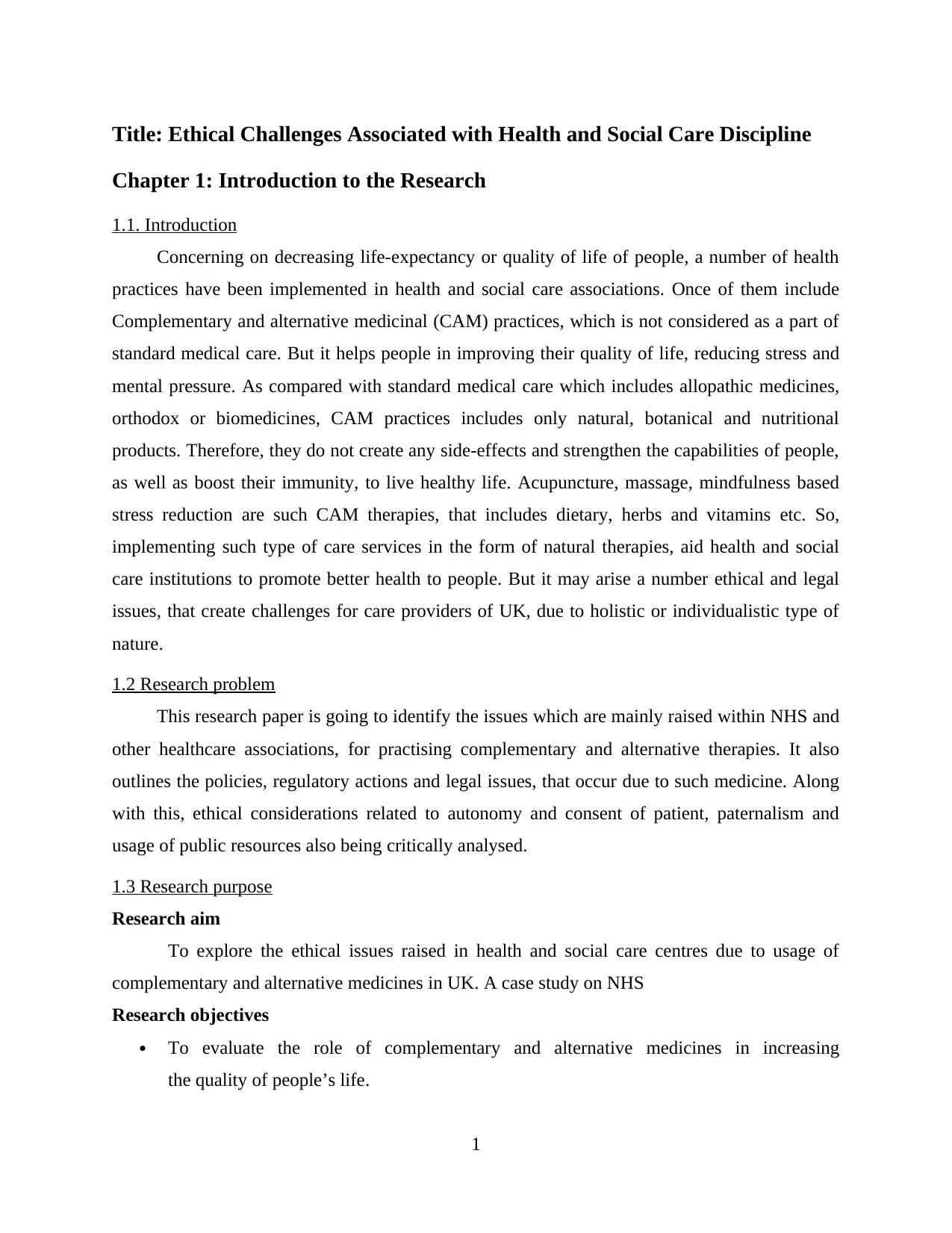
Title: Ethical Challenges Associated with Health and Social Care Discipline
Chapter 1: Introduction to the Research
1.1. Introduction
Concerning on decreasing life-expectancy or quality of life of people, a number of health
practices have been implemented in health and social care associations. Once of them include
Complementary and alternative medicinal (CAM) practices, which is not considered as a part of
standard medical care. But it helps people in improving their quality of life, reducing stress and
mental pressure. As compared with standard medical care which includes allopathic medicines,
orthodox or biomedicines, CAM practices includes only natural, botanical and nutritional
products. Therefore, they do not create any side-effects and strengthen the capabilities of people,
as well as boost their immunity, to live healthy life. Acupuncture, massage, mindfulness based
stress reduction are such CAM therapies, that includes dietary, herbs and vitamins etc. So,
implementing such type of care services in the form of natural therapies, aid health and social
care institutions to promote better health to people. But it may arise a number ethical and legal
issues, that create challenges for care providers of UK, due to holistic or individualistic type of
nature.
1.2 Research problem
This research paper is going to identify the issues which are mainly raised within NHS and
other healthcare associations, for practising complementary and alternative therapies. It also
outlines the policies, regulatory actions and legal issues, that occur due to such medicine. Along
with this, ethical considerations related to autonomy and consent of patient, paternalism and
usage of public resources also being critically analysed.
1.3 Research purpose
Research aim
To explore the ethical issues raised in health and social care centres due to usage of
complementary and alternative medicines in UK. A case study on NHS
Research objectives
To evaluate the role of complementary and alternative medicines in increasing
the quality of people’s life.
1
Chapter 1: Introduction to the Research
1.1. Introduction
Concerning on decreasing life-expectancy or quality of life of people, a number of health
practices have been implemented in health and social care associations. Once of them include
Complementary and alternative medicinal (CAM) practices, which is not considered as a part of
standard medical care. But it helps people in improving their quality of life, reducing stress and
mental pressure. As compared with standard medical care which includes allopathic medicines,
orthodox or biomedicines, CAM practices includes only natural, botanical and nutritional
products. Therefore, they do not create any side-effects and strengthen the capabilities of people,
as well as boost their immunity, to live healthy life. Acupuncture, massage, mindfulness based
stress reduction are such CAM therapies, that includes dietary, herbs and vitamins etc. So,
implementing such type of care services in the form of natural therapies, aid health and social
care institutions to promote better health to people. But it may arise a number ethical and legal
issues, that create challenges for care providers of UK, due to holistic or individualistic type of
nature.
1.2 Research problem
This research paper is going to identify the issues which are mainly raised within NHS and
other healthcare associations, for practising complementary and alternative therapies. It also
outlines the policies, regulatory actions and legal issues, that occur due to such medicine. Along
with this, ethical considerations related to autonomy and consent of patient, paternalism and
usage of public resources also being critically analysed.
1.3 Research purpose
Research aim
To explore the ethical issues raised in health and social care centres due to usage of
complementary and alternative medicines in UK. A case study on NHS
Research objectives
To evaluate the role of complementary and alternative medicines in increasing
the quality of people’s life.
1
Paraphrase This Document
Need a fresh take? Get an instant paraphrase of this document with our AI Paraphraser
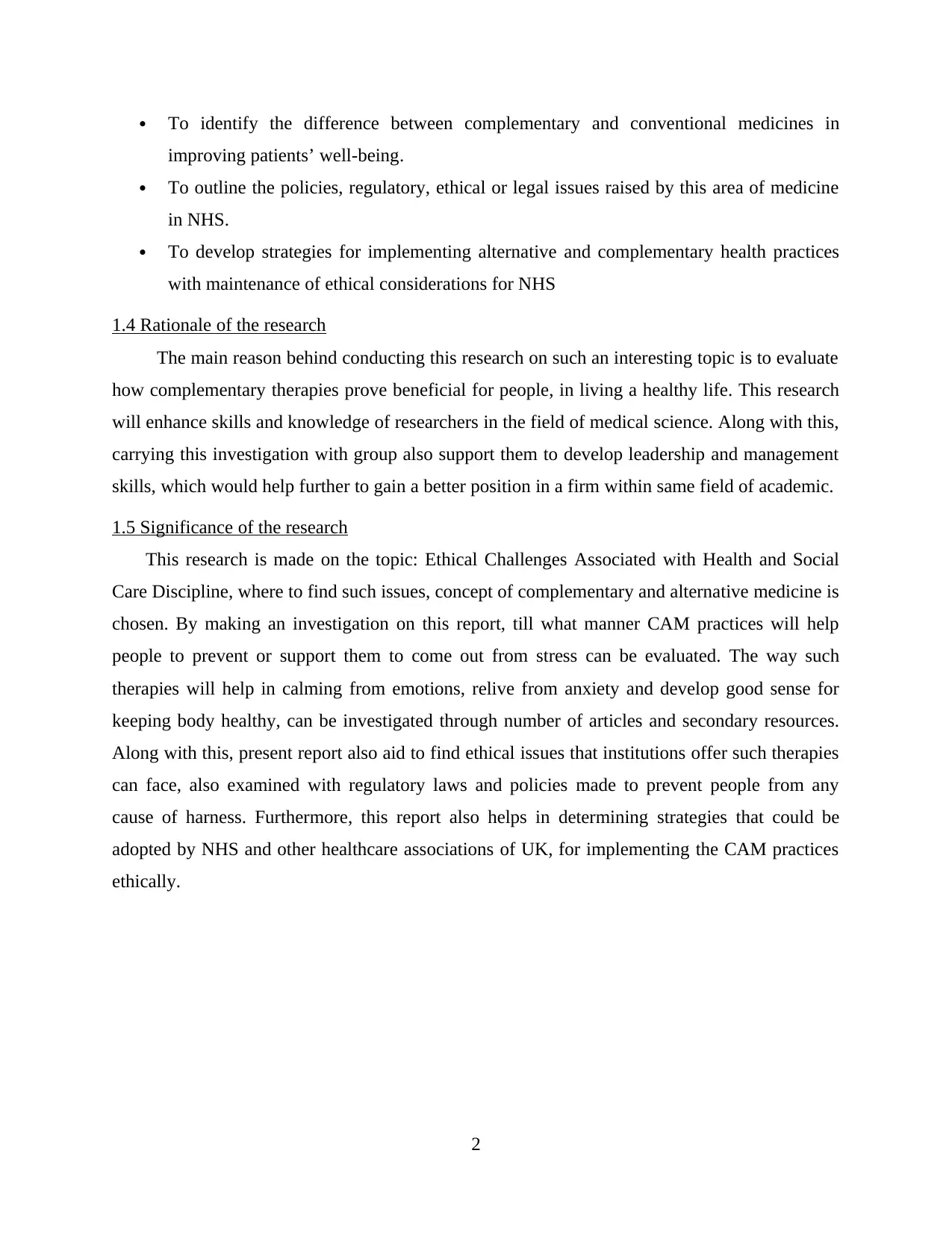
To identify the difference between complementary and conventional medicines in
improving patients’ well-being.
To outline the policies, regulatory, ethical or legal issues raised by this area of medicine
in NHS.
To develop strategies for implementing alternative and complementary health practices
with maintenance of ethical considerations for NHS
1.4 Rationale of the research
The main reason behind conducting this research on such an interesting topic is to evaluate
how complementary therapies prove beneficial for people, in living a healthy life. This research
will enhance skills and knowledge of researchers in the field of medical science. Along with this,
carrying this investigation with group also support them to develop leadership and management
skills, which would help further to gain a better position in a firm within same field of academic.
1.5 Significance of the research
This research is made on the topic: Ethical Challenges Associated with Health and Social
Care Discipline, where to find such issues, concept of complementary and alternative medicine is
chosen. By making an investigation on this report, till what manner CAM practices will help
people to prevent or support them to come out from stress can be evaluated. The way such
therapies will help in calming from emotions, relive from anxiety and develop good sense for
keeping body healthy, can be investigated through number of articles and secondary resources.
Along with this, present report also aid to find ethical issues that institutions offer such therapies
can face, also examined with regulatory laws and policies made to prevent people from any
cause of harness. Furthermore, this report also helps in determining strategies that could be
adopted by NHS and other healthcare associations of UK, for implementing the CAM practices
ethically.
2
improving patients’ well-being.
To outline the policies, regulatory, ethical or legal issues raised by this area of medicine
in NHS.
To develop strategies for implementing alternative and complementary health practices
with maintenance of ethical considerations for NHS
1.4 Rationale of the research
The main reason behind conducting this research on such an interesting topic is to evaluate
how complementary therapies prove beneficial for people, in living a healthy life. This research
will enhance skills and knowledge of researchers in the field of medical science. Along with this,
carrying this investigation with group also support them to develop leadership and management
skills, which would help further to gain a better position in a firm within same field of academic.
1.5 Significance of the research
This research is made on the topic: Ethical Challenges Associated with Health and Social
Care Discipline, where to find such issues, concept of complementary and alternative medicine is
chosen. By making an investigation on this report, till what manner CAM practices will help
people to prevent or support them to come out from stress can be evaluated. The way such
therapies will help in calming from emotions, relive from anxiety and develop good sense for
keeping body healthy, can be investigated through number of articles and secondary resources.
Along with this, present report also aid to find ethical issues that institutions offer such therapies
can face, also examined with regulatory laws and policies made to prevent people from any
cause of harness. Furthermore, this report also helps in determining strategies that could be
adopted by NHS and other healthcare associations of UK, for implementing the CAM practices
ethically.
2
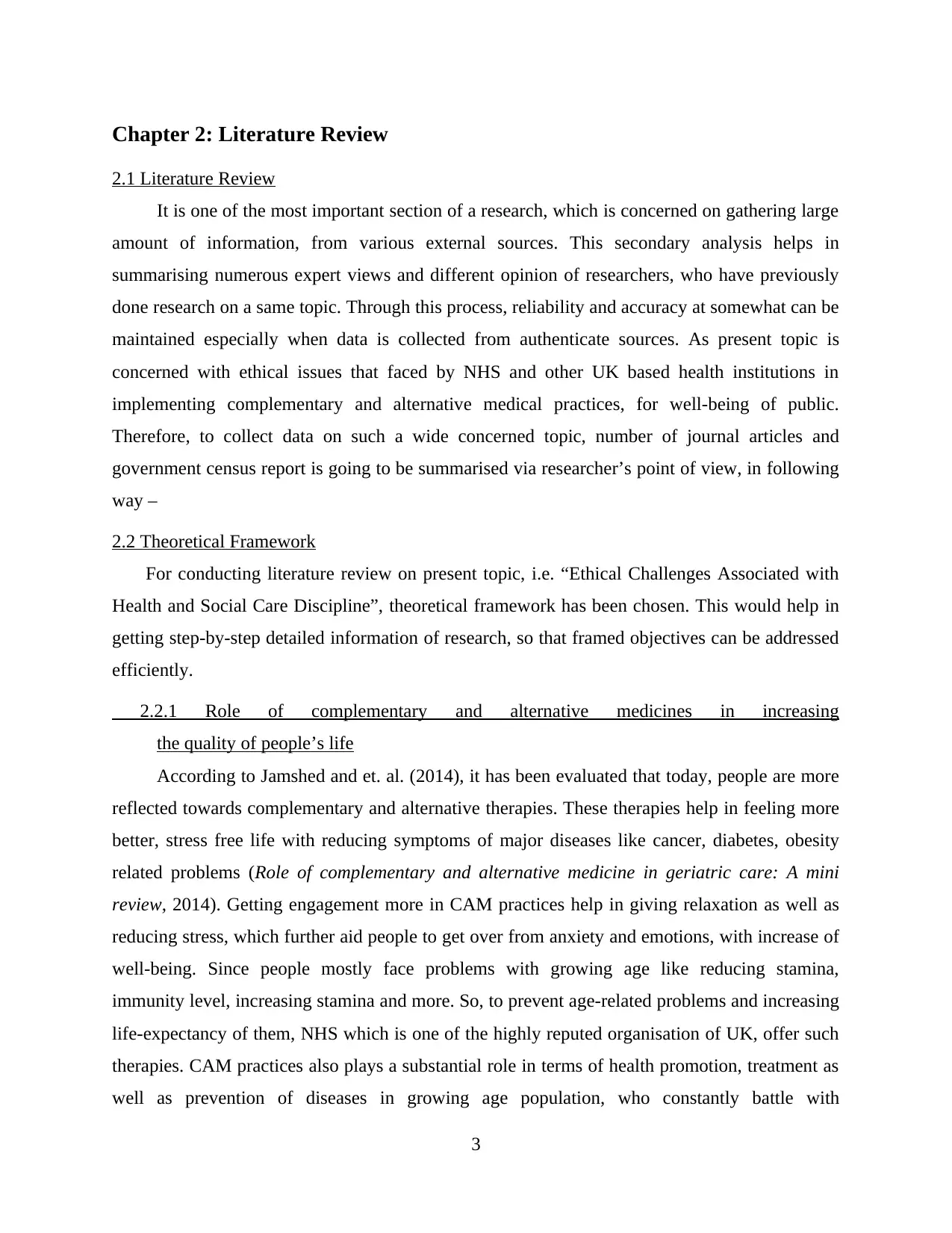
Chapter 2: Literature Review
2.1 Literature Review
It is one of the most important section of a research, which is concerned on gathering large
amount of information, from various external sources. This secondary analysis helps in
summarising numerous expert views and different opinion of researchers, who have previously
done research on a same topic. Through this process, reliability and accuracy at somewhat can be
maintained especially when data is collected from authenticate sources. As present topic is
concerned with ethical issues that faced by NHS and other UK based health institutions in
implementing complementary and alternative medical practices, for well-being of public.
Therefore, to collect data on such a wide concerned topic, number of journal articles and
government census report is going to be summarised via researcher’s point of view, in following
way –
2.2 Theoretical Framework
For conducting literature review on present topic, i.e. “Ethical Challenges Associated with
Health and Social Care Discipline”, theoretical framework has been chosen. This would help in
getting step-by-step detailed information of research, so that framed objectives can be addressed
efficiently.
2.2.1 Role of complementary and alternative medicines in increasing
the quality of people’s life
According to Jamshed and et. al. (2014), it has been evaluated that today, people are more
reflected towards complementary and alternative therapies. These therapies help in feeling more
better, stress free life with reducing symptoms of major diseases like cancer, diabetes, obesity
related problems (Role of complementary and alternative medicine in geriatric care: A mini
review, 2014). Getting engagement more in CAM practices help in giving relaxation as well as
reducing stress, which further aid people to get over from anxiety and emotions, with increase of
well-being. Since people mostly face problems with growing age like reducing stamina,
immunity level, increasing stamina and more. So, to prevent age-related problems and increasing
life-expectancy of them, NHS which is one of the highly reputed organisation of UK, offer such
therapies. CAM practices also plays a substantial role in terms of health promotion, treatment as
well as prevention of diseases in growing age population, who constantly battle with
3
2.1 Literature Review
It is one of the most important section of a research, which is concerned on gathering large
amount of information, from various external sources. This secondary analysis helps in
summarising numerous expert views and different opinion of researchers, who have previously
done research on a same topic. Through this process, reliability and accuracy at somewhat can be
maintained especially when data is collected from authenticate sources. As present topic is
concerned with ethical issues that faced by NHS and other UK based health institutions in
implementing complementary and alternative medical practices, for well-being of public.
Therefore, to collect data on such a wide concerned topic, number of journal articles and
government census report is going to be summarised via researcher’s point of view, in following
way –
2.2 Theoretical Framework
For conducting literature review on present topic, i.e. “Ethical Challenges Associated with
Health and Social Care Discipline”, theoretical framework has been chosen. This would help in
getting step-by-step detailed information of research, so that framed objectives can be addressed
efficiently.
2.2.1 Role of complementary and alternative medicines in increasing
the quality of people’s life
According to Jamshed and et. al. (2014), it has been evaluated that today, people are more
reflected towards complementary and alternative therapies. These therapies help in feeling more
better, stress free life with reducing symptoms of major diseases like cancer, diabetes, obesity
related problems (Role of complementary and alternative medicine in geriatric care: A mini
review, 2014). Getting engagement more in CAM practices help in giving relaxation as well as
reducing stress, which further aid people to get over from anxiety and emotions, with increase of
well-being. Since people mostly face problems with growing age like reducing stamina,
immunity level, increasing stamina and more. So, to prevent age-related problems and increasing
life-expectancy of them, NHS which is one of the highly reputed organisation of UK, offer such
therapies. CAM practices also plays a substantial role in terms of health promotion, treatment as
well as prevention of diseases in growing age population, who constantly battle with
3
⊘ This is a preview!⊘
Do you want full access?
Subscribe today to unlock all pages.

Trusted by 1+ million students worldwide
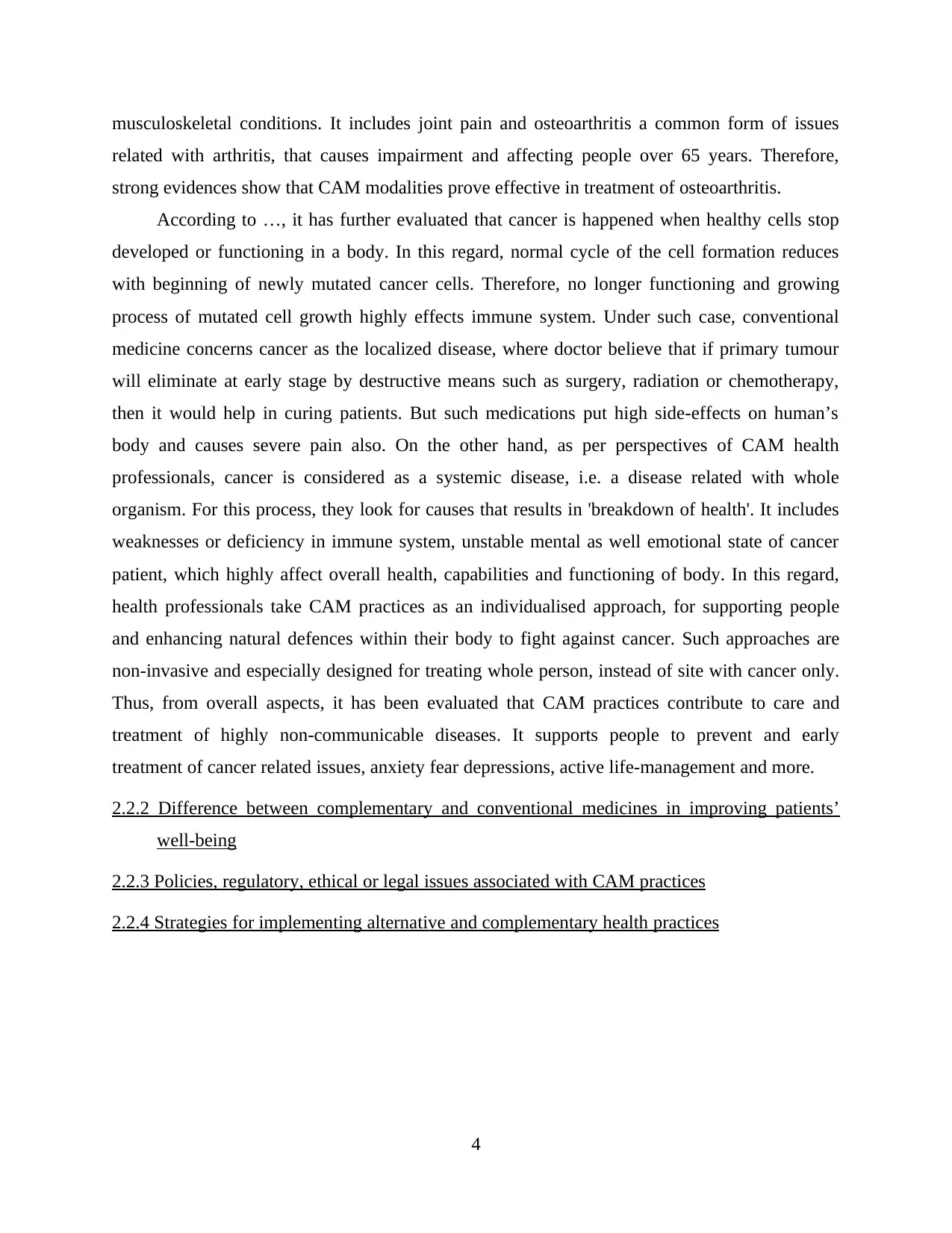
musculoskeletal conditions. It includes joint pain and osteoarthritis a common form of issues
related with arthritis, that causes impairment and affecting people over 65 years. Therefore,
strong evidences show that CAM modalities prove effective in treatment of osteoarthritis.
According to …, it has further evaluated that cancer is happened when healthy cells stop
developed or functioning in a body. In this regard, normal cycle of the cell formation reduces
with beginning of newly mutated cancer cells. Therefore, no longer functioning and growing
process of mutated cell growth highly effects immune system. Under such case, conventional
medicine concerns cancer as the localized disease, where doctor believe that if primary tumour
will eliminate at early stage by destructive means such as surgery, radiation or chemotherapy,
then it would help in curing patients. But such medications put high side-effects on human’s
body and causes severe pain also. On the other hand, as per perspectives of CAM health
professionals, cancer is considered as a systemic disease, i.e. a disease related with whole
organism. For this process, they look for causes that results in 'breakdown of health'. It includes
weaknesses or deficiency in immune system, unstable mental as well emotional state of cancer
patient, which highly affect overall health, capabilities and functioning of body. In this regard,
health professionals take CAM practices as an individualised approach, for supporting people
and enhancing natural defences within their body to fight against cancer. Such approaches are
non-invasive and especially designed for treating whole person, instead of site with cancer only.
Thus, from overall aspects, it has been evaluated that CAM practices contribute to care and
treatment of highly non-communicable diseases. It supports people to prevent and early
treatment of cancer related issues, anxiety fear depressions, active life-management and more.
2.2.2 Difference between complementary and conventional medicines in improving patients’
well-being
2.2.3 Policies, regulatory, ethical or legal issues associated with CAM practices
2.2.4 Strategies for implementing alternative and complementary health practices
4
related with arthritis, that causes impairment and affecting people over 65 years. Therefore,
strong evidences show that CAM modalities prove effective in treatment of osteoarthritis.
According to …, it has further evaluated that cancer is happened when healthy cells stop
developed or functioning in a body. In this regard, normal cycle of the cell formation reduces
with beginning of newly mutated cancer cells. Therefore, no longer functioning and growing
process of mutated cell growth highly effects immune system. Under such case, conventional
medicine concerns cancer as the localized disease, where doctor believe that if primary tumour
will eliminate at early stage by destructive means such as surgery, radiation or chemotherapy,
then it would help in curing patients. But such medications put high side-effects on human’s
body and causes severe pain also. On the other hand, as per perspectives of CAM health
professionals, cancer is considered as a systemic disease, i.e. a disease related with whole
organism. For this process, they look for causes that results in 'breakdown of health'. It includes
weaknesses or deficiency in immune system, unstable mental as well emotional state of cancer
patient, which highly affect overall health, capabilities and functioning of body. In this regard,
health professionals take CAM practices as an individualised approach, for supporting people
and enhancing natural defences within their body to fight against cancer. Such approaches are
non-invasive and especially designed for treating whole person, instead of site with cancer only.
Thus, from overall aspects, it has been evaluated that CAM practices contribute to care and
treatment of highly non-communicable diseases. It supports people to prevent and early
treatment of cancer related issues, anxiety fear depressions, active life-management and more.
2.2.2 Difference between complementary and conventional medicines in improving patients’
well-being
2.2.3 Policies, regulatory, ethical or legal issues associated with CAM practices
2.2.4 Strategies for implementing alternative and complementary health practices
4
Paraphrase This Document
Need a fresh take? Get an instant paraphrase of this document with our AI Paraphraser

Chapter 3: Research Methodology
3.1 Research Design
It is one of the most important section of a project, which defines overall strategy chosen to
conduct a research. Research design enables the researchers to address entire project issues
through evidence based techniques in unambiguously manner. Hereby, evidence can be obtained
to design methods, techniques and strategy which will be taken under study, so that each and
every concept can be cleared in effective manner. However, sometime project makers used to
start investigations too early, without considering the effectiveness of tools and techniques or
analysing in which manner information need to be obtained. This would result in arising issues
of weakening and unconvincing the result obtained, which consequently fail researchers to
adequately address entire research problem in desired way. Therefore, before designing research,
they must evaluate purpose of conducting report, identify problem which need to be investigated,
clearly specify hypothesis and describe way of collecting as well as analysing information. All
these considerations will aid to choose best research design among descriptive, correlational and
experimental. In this regard, by determining overall purpose of present study, project makers
have chosen descriptive research design to set strategies for conducting investigation within
qualitative way.
3.2 Research Methods
This part of research shows methodologies which are going to be applied for conducting a
desired study. It includes qualitative and quantitative methods, where first one helps in
summarising theoretical information, while later one for data that can be analysed via
applications of statistics. Therefore, before applying any method, it is essential for researchers to
analyse concept of both. Qualitative research refers to primarily exploratory method, which is
used to gain the understanding related to underlying reasons and opinion of experts. This method
helps in providing an insight into main problem, which further aid to develop hypotheses or ideas
for potential research. It also helps in exploring the uncover trends in opinions and thoughts in
order to dive deeper into problem. On contrast, Qualitative research helps in collecting numerical
information or data that can be represented numerically, through unstructured/semi-structured
techniques. Some common methods include focus groups (group discussions), individual
5
3.1 Research Design
It is one of the most important section of a project, which defines overall strategy chosen to
conduct a research. Research design enables the researchers to address entire project issues
through evidence based techniques in unambiguously manner. Hereby, evidence can be obtained
to design methods, techniques and strategy which will be taken under study, so that each and
every concept can be cleared in effective manner. However, sometime project makers used to
start investigations too early, without considering the effectiveness of tools and techniques or
analysing in which manner information need to be obtained. This would result in arising issues
of weakening and unconvincing the result obtained, which consequently fail researchers to
adequately address entire research problem in desired way. Therefore, before designing research,
they must evaluate purpose of conducting report, identify problem which need to be investigated,
clearly specify hypothesis and describe way of collecting as well as analysing information. All
these considerations will aid to choose best research design among descriptive, correlational and
experimental. In this regard, by determining overall purpose of present study, project makers
have chosen descriptive research design to set strategies for conducting investigation within
qualitative way.
3.2 Research Methods
This part of research shows methodologies which are going to be applied for conducting a
desired study. It includes qualitative and quantitative methods, where first one helps in
summarising theoretical information, while later one for data that can be analysed via
applications of statistics. Therefore, before applying any method, it is essential for researchers to
analyse concept of both. Qualitative research refers to primarily exploratory method, which is
used to gain the understanding related to underlying reasons and opinion of experts. This method
helps in providing an insight into main problem, which further aid to develop hypotheses or ideas
for potential research. It also helps in exploring the uncover trends in opinions and thoughts in
order to dive deeper into problem. On contrast, Qualitative research helps in collecting numerical
information or data that can be represented numerically, through unstructured/semi-structured
techniques. Some common methods include focus groups (group discussions), individual
5
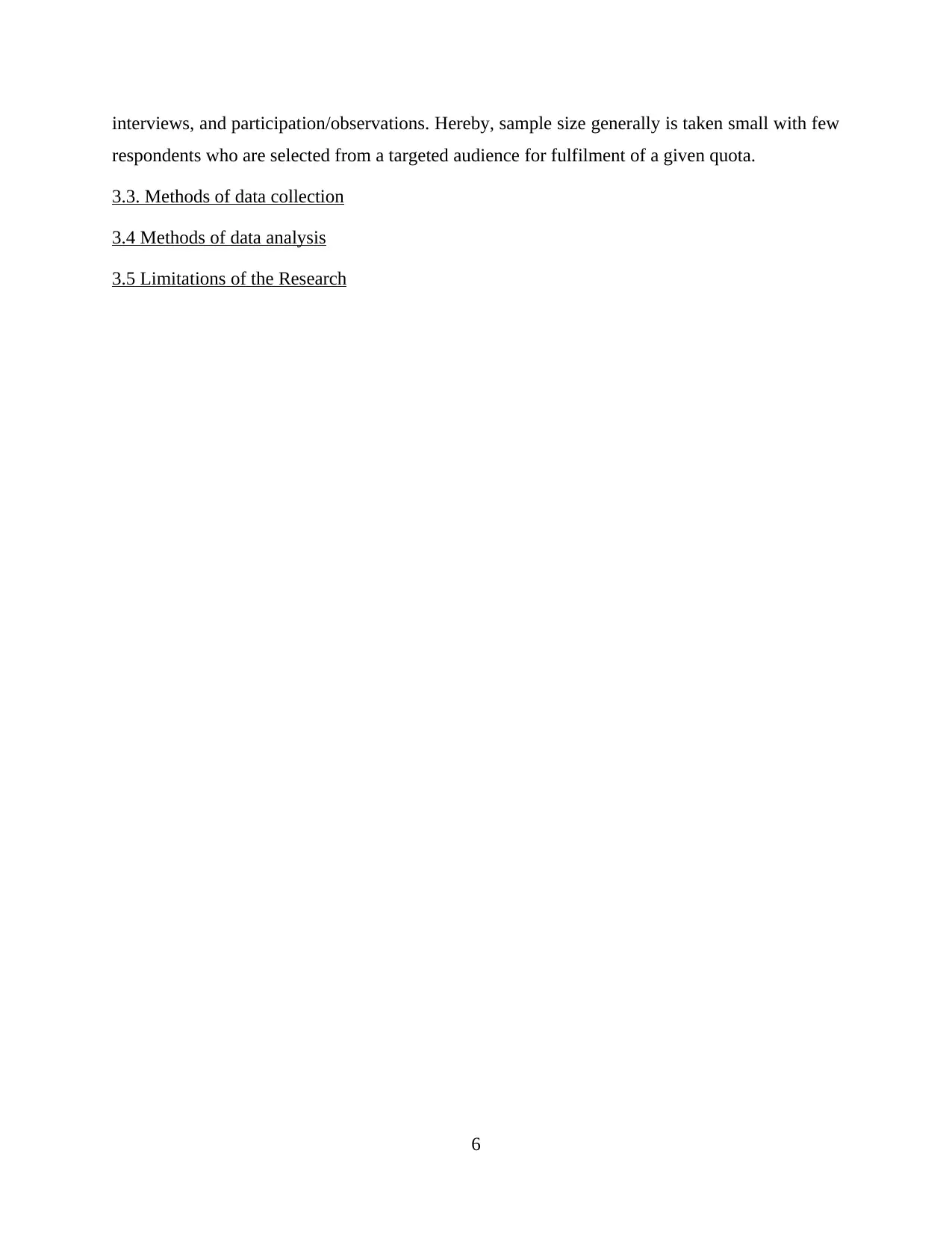
interviews, and participation/observations. Hereby, sample size generally is taken small with few
respondents who are selected from a targeted audience for fulfilment of a given quota.
3.3. Methods of data collection
3.4 Methods of data analysis
3.5 Limitations of the Research
6
respondents who are selected from a targeted audience for fulfilment of a given quota.
3.3. Methods of data collection
3.4 Methods of data analysis
3.5 Limitations of the Research
6
⊘ This is a preview!⊘
Do you want full access?
Subscribe today to unlock all pages.

Trusted by 1+ million students worldwide

Chapter 5: Conclusion and Recommendations
5.1 Conclusion
5.2 Recommendations
7
5.1 Conclusion
5.2 Recommendations
7
Paraphrase This Document
Need a fresh take? Get an instant paraphrase of this document with our AI Paraphraser

References
Books and Journals
Haase, K. R. and et. al., 2020. The role of Internet cancer information for older adults with
cancer: Perspectives of older adults and healthcare professionals. International Journal of
Older People Nursing, p.e12303.
Wagner, C., 2020. Complementary and alternative medicine. The United States Healthcare
System: Overview, Driving Forces, and Outlook for the Future. Chicago, IL: Health
Administration Press.
Walthert, L. and et. al., 2020. Complementary Medicine Use and Self-perceived Discrimination
Among Asylum Seekers in Switzerland: A Cross-sectional Study. Journal of immigrant
and minority health, 22(1), pp.61-65.
Cocchiara, R. A. and et. al., 2020. Tai Chi and Workplace Wellness for Health Care Workers: A
Systematic Review. International Journal of Environmental Research and Public
Health, 17(1), p.343.
Syed, I. A. and et. al., 2016. Beliefs and practices of complementary and alternative medicine
(CAM) among HIV/AIDS patients: A qualitative exploration. European Journal of
Integrative Medicine, 8(1), pp.41-47.
Kolen, M. J. and Brennan, R.L., 2013. Test equating: Methods and practices. Springer Science
& Business Media.
Long, C.R. and et. al., 2014. Faculty development initiatives to advance research literacy and
evidence-based practice at CAM academic institutions. The Journal of Alternative and
Complementary Medicine, 20(7), pp.563-570.
Online
Role of complementary and alternative medicine in geriatric care: A mini review. 2014.
[Online] Available Through:
<https://www.ncbi.nlm.nih.gov/pmc/articles/PMC4127825/>.
8
Books and Journals
Haase, K. R. and et. al., 2020. The role of Internet cancer information for older adults with
cancer: Perspectives of older adults and healthcare professionals. International Journal of
Older People Nursing, p.e12303.
Wagner, C., 2020. Complementary and alternative medicine. The United States Healthcare
System: Overview, Driving Forces, and Outlook for the Future. Chicago, IL: Health
Administration Press.
Walthert, L. and et. al., 2020. Complementary Medicine Use and Self-perceived Discrimination
Among Asylum Seekers in Switzerland: A Cross-sectional Study. Journal of immigrant
and minority health, 22(1), pp.61-65.
Cocchiara, R. A. and et. al., 2020. Tai Chi and Workplace Wellness for Health Care Workers: A
Systematic Review. International Journal of Environmental Research and Public
Health, 17(1), p.343.
Syed, I. A. and et. al., 2016. Beliefs and practices of complementary and alternative medicine
(CAM) among HIV/AIDS patients: A qualitative exploration. European Journal of
Integrative Medicine, 8(1), pp.41-47.
Kolen, M. J. and Brennan, R.L., 2013. Test equating: Methods and practices. Springer Science
& Business Media.
Long, C.R. and et. al., 2014. Faculty development initiatives to advance research literacy and
evidence-based practice at CAM academic institutions. The Journal of Alternative and
Complementary Medicine, 20(7), pp.563-570.
Online
Role of complementary and alternative medicine in geriatric care: A mini review. 2014.
[Online] Available Through:
<https://www.ncbi.nlm.nih.gov/pmc/articles/PMC4127825/>.
8
1 out of 11
Related Documents
Your All-in-One AI-Powered Toolkit for Academic Success.
+13062052269
info@desklib.com
Available 24*7 on WhatsApp / Email
![[object Object]](/_next/static/media/star-bottom.7253800d.svg)
Unlock your academic potential
Copyright © 2020–2026 A2Z Services. All Rights Reserved. Developed and managed by ZUCOL.





